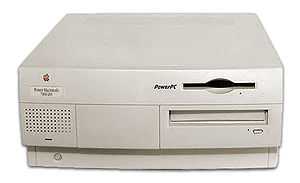Power Macintosh 7300
 |
| Release date |
February 17, 1997 |
|---|
| Introductory price |
1700, 2300 |
|---|
| Discontinued |
November 10, 1997 |
|---|
| Operating system |
System 7.5.5-Mac OS 9.1 |
|---|
| CPU |
PowerPC 604e @ 166 - 200 MHz |
|---|
| Memory |
16 MiB, expandable to 1 GiB (70 ns 168-pin 5V DIMM) |
|---|
The Power Macintosh 7300 (Codename: "Montana"; also sold with server software as the Apple Workgroup Server 7350) is a personal computer that is a part of Apple Computer's Power Macintosh series of Macintosh computers. It was introduced at a processor speed of 180 or 200 MHz (in Europe and Asia, an additional 166 MHz configuration was available) in February 1997 alongside the Power Macintosh 8600 and the Power Macintosh 9600. It replaced both the Power Macintosh 7200 and the Power Macintosh 7600, and was itself discontinued in favor of the Power Macintosh G3 desktop model in November 1997.
The 7300 uses the same "Outrigger" case as its predecessors, but features an enhanced PowerPC 604e CPU. However, it no longer came with the video in capability the 7600 had, which possibly accounts for the fact that this is the only time that Apple used a lower model number for an upgraded model.[1] Apart from that, the 7300 is more closely related to the 7600 than to the 7200, with features such as a processor daughtercard and interleaved RAM. The 7300/180 model was also available in a "PC compatible" configuration that included a 166 MHz Pentium processor with its own RAM (up to 64 MiB) on a PCI card which also provided a PC game port.
Like the Power Macintosh 7600, the 7300 series utilised 168 pin DRAM DIMMS, allowing for a total of 8 to be added for 1024MiB in total. It utilised VRAM SIMMS and allowed 4 units to be added for a total of 4MiB, providing output at a resolution of up to 152x870 at 24-bit and 1280x1024 at 16-bit.[2] Additionally, it featured 3 PCI slots allowing the addition of third party cards, including graphics cards.
It shipped with a 2GB SCSI hard drive as standard, on an internal 10MiB/s SCSI bus. It also featured an external 5MiB/s SCSI port.[3]
External links
References
|
|---|
| | Computers |
Apple | |
|---|
| | |
|---|
| | |
|---|
| Macintosh LC | |
|---|
| | |
|---|
| | |
|---|
| | |
|---|
| Miscellaneous | |
|---|
|
|---|
| | Peripherals |
| |
|---|
| External drives | |
|---|
| Input devices | |
|---|
| Networking | |
|---|
| | |
|---|
| | |
|---|
| Other | |
|---|
|
|---|
|
Apple hardware since 1998 |
|
